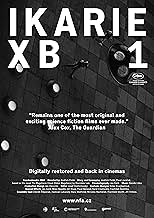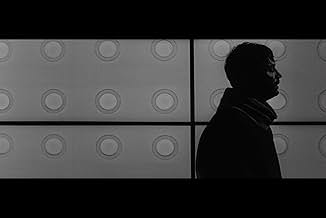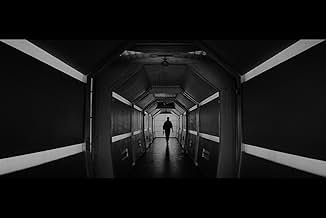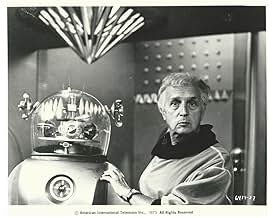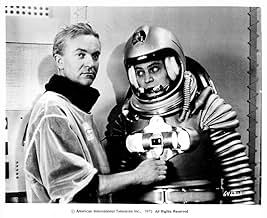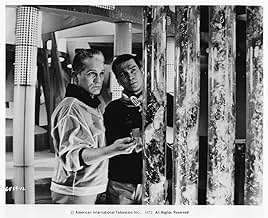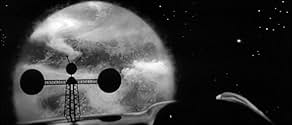Ikarie XB 1
- 1963
- 1 घं 26 मि
IMDb रेटिंग
6.9/10
3.2 हज़ार
आपकी रेटिंग
अपनी भाषा में प्लॉट जोड़ेंThe year is 2163. Starship Ikarie XB 1 embarks on a long journey across the universe to search for life on the planets of Alpha Centauri.The year is 2163. Starship Ikarie XB 1 embarks on a long journey across the universe to search for life on the planets of Alpha Centauri.The year is 2163. Starship Ikarie XB 1 embarks on a long journey across the universe to search for life on the planets of Alpha Centauri.
- पुरस्कार
- कुल 1 जीत
फ़ीचर्ड समीक्षाएं
Written by the same man who wrote Solaris, rather than a science fantasy, space opera, or race movie like many other scifi films of that era (many of which are just as excellent in their own way - see The Sky Calls, Planeta Bur, or Forbidden Planet, for example), Ikarie XB1 (aka Journey to the End of the Universe) is a serious-minded science fiction drama, with element of mystery and suspense.
My rating of 9 out of 10 Stars might be a little exuberant, but that was my reaction to the film. The sets are sumptuous, almost art deco, the black and white cinematography crisp and beautiful to look at, and the acting always competent or better. The score is largely electronic, with some distorted electric guitar, and no orchestral elements.
Ikarie XB1 is so different from a lot of other science fiction cinema being produced at the time that I found it to be a captivating surprise.
My rating of 9 out of 10 Stars might be a little exuberant, but that was my reaction to the film. The sets are sumptuous, almost art deco, the black and white cinematography crisp and beautiful to look at, and the acting always competent or better. The score is largely electronic, with some distorted electric guitar, and no orchestral elements.
Ikarie XB1 is so different from a lot of other science fiction cinema being produced at the time that I found it to be a captivating surprise.
This czech scifi made in 1963 is surprisingly fresh compared to most films within the scifi genre.
The story of a multinational crew heading to unknown planet and along its path has to deal with many dangerous situations, has to be one of the most used story lines in scifi.
Even though we've seen so many times this film uses a very lowkey, socialrealistic approach. More reminiscent of latter efforts like Alien (1979), Silent Running (1972), Outland (1981).
This film portrays the crew and its members, struggling with everyday problems. Like childbirth, parties, relationships in space etc.
There is also the fact that this film was made during communist rule in Czechoslovakia which might explain the lack of glamorous, action filled scenes. In fact the films hints that decadent, capitalistic society is doomed to fail.
But there is also hints that the communistic state might contain flaws as well.
Todays audience might be disapproving against the sometimes slow, socialrealistic tone/style of the film but I for one found it quite refreshing.
Well-made scifi films without action, ridiculous high tempo, is hard to come by, and I hope more people will see this film.
The story of a multinational crew heading to unknown planet and along its path has to deal with many dangerous situations, has to be one of the most used story lines in scifi.
Even though we've seen so many times this film uses a very lowkey, socialrealistic approach. More reminiscent of latter efforts like Alien (1979), Silent Running (1972), Outland (1981).
This film portrays the crew and its members, struggling with everyday problems. Like childbirth, parties, relationships in space etc.
There is also the fact that this film was made during communist rule in Czechoslovakia which might explain the lack of glamorous, action filled scenes. In fact the films hints that decadent, capitalistic society is doomed to fail.
But there is also hints that the communistic state might contain flaws as well.
Todays audience might be disapproving against the sometimes slow, socialrealistic tone/style of the film but I for one found it quite refreshing.
Well-made scifi films without action, ridiculous high tempo, is hard to come by, and I hope more people will see this film.
Still relatively unfamiliar to western audiences, Ikarie XB 1 is an example of east European science fiction cinema on a fairly ambitious scale deserving of wider appreciation. Usually it's been only seen in a butchered edition created Stateside - duly shorn of a plot strand, dubbed with a different ending, with a dumb title.
With the benefit of hindsight, a lot of the original seems familiar. With its clean interior ship design, crew neck uniforms all round, glide doors, shiny deck flooring as well as a 15-year mission to seek out new life, Ikarie may have given later pause for thought for a certain Gene Roddenberry. Genre fans will also note that, during the first big set piece, the crew are startled by an unexpected alarm and deviate from their mission to investigate a derelict spacecraft - events which end with a nuclear detonation in space. Add to this the changes wrought by the American bastardisation of Voyage To The End Of The Universe, that included an ending which anticipates Planet of the Apes, as well as its possible inspiration to Kubrick when planning 2001, and Ikarie certainly offers much of interest. Not to mention its own borrowings eg Ikarie's robot Patrick, inspired by Forbidden Planet (1956)
Polák's was also responsible for an intriguing Nazi time travelling movie, with a small cult on its own account, Tomorrow I'll Wake Up And Scald Myself With Tea, made in the late 1970s. Less idiosyncratic than this, one imagines, Ikarie is much more serious in tone, set mostly aboard a roomy spacecraft, crewed by 40, dispatched to discover if there is any life on Alpha Centauri. A feeling of worthwhile isolation permeates this journey, with none of the trivial, trials and stresses one expects from space dramas made closer to home at this time, where mad scientists lurk, robots lumber threateningly or spacewomen defer to their mates. Missing too is the pseudo technical claptrap which lumbers much American SF, then or now. Ikarie's hardware exists mainly in the background, without need of explanation. The film expects us to take its conspicuous 22nd century advances just as seen, being concerned more with sociology than technology.
Ikarie features a harmonious society in miniature, shown in a series of interactions aboard, even down to the calm acceptance of on board pregnancy - an adult theme incidentally completely excised in the American version. In such an hospitable environment, even the mad can be talked round without violence, as in the case of Michael (Otto Lackovic) who, affected by radiation and in a disastrous manoeuvre, wants to turn the ship back to Earth. That the only real threat the crew face is an external one is significant, and also primes the dramatic moment that begins the narrative. A flash-forward to when (infected by the same source, as we learn later), one of the crew is wandering, bewildered and aggressive, through the ship. "Earth is gone," he says. "Earth never existed." But he's not beyond help from his peers. Here the deluded or mad in space are not assumed lost, such as we might see in such recent American films as Event Horizon, but taken back and with promise of cure at that.
Critics have contrasted these shipboard mores to the signs of capitalist degeneracy confronting those who board the 'Tornado', the derelict space station from 1987 unexpectedly encountered en route. Here, amidst the dark clutter of its interior, are found signs of gambling and money, coded elements of capitalist speculation, just as fatal as the death gas and nuclear warheads also there. For those who explore it, the Tornado reflects a place thought left behind, both geographically and politically. "We have discovered the 20th century," says one dismayed crewman. The determined self destruction encountered by those who board the derelict recalls one of TV's original Star Trek shows, and those found died as result of a selfish fight for survival. The signs of a corrupt political system fall exposed with as much horror as does (in a notable moment) the skin off the Tornado captain's face.
This, and then the debilitating effects of rays that emanate from a hitherto unknown black star are the two principal threats facing the crew. How they finally overcome this last hurdle is part of the end of the quest. Without giving too much away, it is sufficient to say that the close of the film, the ship's long anticipated arrival at Alpha Centauri's 'white planet', brings a sequence both uplifting and brief, carrying over the theme of mutually beneficial cooperation. But viewers today may find less interest in the ending than the scenes that have preceded it. It's the Ikarie crew's social or dutiful pairings, even to the point of bringing each other flowers, or taking showers together, which lay at the heart of the film, rather than any encounter of a new civilisation and the socialist message entailed. Whilst in basic narrative terms the 'white planet' brings closure, our attentions have for long been focused elsewhere, in scenes such as the notable dance sequence. Through the hypnotic rhythms of Zdenek Liska's striking score, the astronauts take part in something akin to a weird 22nd century disco, their slow somnambulistic movements reassuring while also slightly disturbing. Reassuring, as we can see the crew reacting together as one social unit, even after the inevitable trials of months in space; disturbing because it is all so emotionless and controlled. Such ambiguous group occasions beg questions we really want answered. Are they really happy? Or does the Earth we thought we recognised in them no longer exist?
The Czech originated disc I have seen offers a splendid widescreen transfer of the movie with English subtitles. Most of the extras are unfortunately not subtitled, but there's a chance to see some sample scenes from the American International version, to give an idea of how the original was changed as well as a stills gallery.
With the benefit of hindsight, a lot of the original seems familiar. With its clean interior ship design, crew neck uniforms all round, glide doors, shiny deck flooring as well as a 15-year mission to seek out new life, Ikarie may have given later pause for thought for a certain Gene Roddenberry. Genre fans will also note that, during the first big set piece, the crew are startled by an unexpected alarm and deviate from their mission to investigate a derelict spacecraft - events which end with a nuclear detonation in space. Add to this the changes wrought by the American bastardisation of Voyage To The End Of The Universe, that included an ending which anticipates Planet of the Apes, as well as its possible inspiration to Kubrick when planning 2001, and Ikarie certainly offers much of interest. Not to mention its own borrowings eg Ikarie's robot Patrick, inspired by Forbidden Planet (1956)
Polák's was also responsible for an intriguing Nazi time travelling movie, with a small cult on its own account, Tomorrow I'll Wake Up And Scald Myself With Tea, made in the late 1970s. Less idiosyncratic than this, one imagines, Ikarie is much more serious in tone, set mostly aboard a roomy spacecraft, crewed by 40, dispatched to discover if there is any life on Alpha Centauri. A feeling of worthwhile isolation permeates this journey, with none of the trivial, trials and stresses one expects from space dramas made closer to home at this time, where mad scientists lurk, robots lumber threateningly or spacewomen defer to their mates. Missing too is the pseudo technical claptrap which lumbers much American SF, then or now. Ikarie's hardware exists mainly in the background, without need of explanation. The film expects us to take its conspicuous 22nd century advances just as seen, being concerned more with sociology than technology.
Ikarie features a harmonious society in miniature, shown in a series of interactions aboard, even down to the calm acceptance of on board pregnancy - an adult theme incidentally completely excised in the American version. In such an hospitable environment, even the mad can be talked round without violence, as in the case of Michael (Otto Lackovic) who, affected by radiation and in a disastrous manoeuvre, wants to turn the ship back to Earth. That the only real threat the crew face is an external one is significant, and also primes the dramatic moment that begins the narrative. A flash-forward to when (infected by the same source, as we learn later), one of the crew is wandering, bewildered and aggressive, through the ship. "Earth is gone," he says. "Earth never existed." But he's not beyond help from his peers. Here the deluded or mad in space are not assumed lost, such as we might see in such recent American films as Event Horizon, but taken back and with promise of cure at that.
Critics have contrasted these shipboard mores to the signs of capitalist degeneracy confronting those who board the 'Tornado', the derelict space station from 1987 unexpectedly encountered en route. Here, amidst the dark clutter of its interior, are found signs of gambling and money, coded elements of capitalist speculation, just as fatal as the death gas and nuclear warheads also there. For those who explore it, the Tornado reflects a place thought left behind, both geographically and politically. "We have discovered the 20th century," says one dismayed crewman. The determined self destruction encountered by those who board the derelict recalls one of TV's original Star Trek shows, and those found died as result of a selfish fight for survival. The signs of a corrupt political system fall exposed with as much horror as does (in a notable moment) the skin off the Tornado captain's face.
This, and then the debilitating effects of rays that emanate from a hitherto unknown black star are the two principal threats facing the crew. How they finally overcome this last hurdle is part of the end of the quest. Without giving too much away, it is sufficient to say that the close of the film, the ship's long anticipated arrival at Alpha Centauri's 'white planet', brings a sequence both uplifting and brief, carrying over the theme of mutually beneficial cooperation. But viewers today may find less interest in the ending than the scenes that have preceded it. It's the Ikarie crew's social or dutiful pairings, even to the point of bringing each other flowers, or taking showers together, which lay at the heart of the film, rather than any encounter of a new civilisation and the socialist message entailed. Whilst in basic narrative terms the 'white planet' brings closure, our attentions have for long been focused elsewhere, in scenes such as the notable dance sequence. Through the hypnotic rhythms of Zdenek Liska's striking score, the astronauts take part in something akin to a weird 22nd century disco, their slow somnambulistic movements reassuring while also slightly disturbing. Reassuring, as we can see the crew reacting together as one social unit, even after the inevitable trials of months in space; disturbing because it is all so emotionless and controlled. Such ambiguous group occasions beg questions we really want answered. Are they really happy? Or does the Earth we thought we recognised in them no longer exist?
The Czech originated disc I have seen offers a splendid widescreen transfer of the movie with English subtitles. Most of the extras are unfortunately not subtitled, but there's a chance to see some sample scenes from the American International version, to give an idea of how the original was changed as well as a stills gallery.
Ikarie XB1 is the first Czech SF movie. It was released in black and white only. The story relies to some extent on one of Stanislav Lem's books. The movie is still appreciated not only among science fiction fans in Czechia, but mainly because of its high ambitions. The movie not only shows a trip to proxima centauri, but it also tried to predict future music and dance.
Due to the time it was created (early 60ies) there are some ideological compromises to the communism and cold war.
Due to the time it was created (early 60ies) there are some ideological compromises to the communism and cold war.
Somewhere between the Outer Limits and Star Trek lies this little science fiction gem from the former Czechoslovakia. This isn't I. Robot or that type of science fiction, which is Asimov wrapped up in a shiny steel and glass box. This is the actual story and not just the wrapping paper. It proudly carries on the tradition started by Forbidden Planet and This Island Earth, even though its not as exciting. It is actually more like the Magnetic Monster and the Outer Limits. This is science fiction done in crisp black and white. The screen may not be vivid, yet the special effects have an ethereally surreal quality. Mix that in with the futuristic Shostakovitch-like score and we have a compelling and eerie trip into the unknown.
The excitement and glory that comes from living and exploring space (Star Trek, Star Wars, etc.) is minimized in the movie. We get the basic day to day activities of the crew of the Ikarie, on its 28 month (15 years pass back on Earth) mission to our closest solar system, Alpha Centauri. We also get the dangers and rewards of hurling ourselves into the vast darkness.
It is the 22nd Century and we are out in the galaxy searching for life. The crew is comprised from a co-ed international pool. We never get to see Earth, yet we get a glimpse of what humans are like from the interactions of the crew (work, entertainment, nutritional intervals, exercise, reproduction and crisis). This is a future full of video screens, blasters, personal transmitters, turbo lifts, artificial gravity, Beatnik-like futuristic dancing and even Nike light up magnetic boots. This is the perfect/classical example of the sci-fi antithesis to Idiocracy. Humanity will improve with time.
The future is bright, shiny and worth waiting for. Man fixes the malaise of his species. We are never shown anything more lethal than a hand blaster, when it comes to weapons. On their mission, they encounter a perfectly preserved space relic from an Earth expedition of the 20th century. Let's just say our predecessors had very little nice things to say about us. Let's not forget that the 20th century contained two world wars, numerous genocides, the birth and use of the the atomic bomb.
One would also assume that a movie made in a Soviet influenced country would contain a certain amount of Communist and Pro-Soviet propaganda (for example, Planeta Bura). Thankfully this is all missing. About the biggest commentary comes from the critique of our 20th century counterparts. I found the only anti-capitalist message in the writing on the Earth relic. Everything inside is written in English, the ship was fully loaded with nuclear warheads and the the crew turned on each other. And even this critique is more of a jab at our collective selves then at full fledged opposition to capitalism.
If you are looking for epic space battles for the fate of the universe, look elsewhere because the crew kills absolutely no living thing. If you want 90 minutes of Georges Méliès mixed with Jules Verne, then you have found the perfect movie. I can easily see this movie as an influence on Kubrick's 2001, Rodenberry's Star Trek, Lucas' Star Wars and even Irwin Allen's Lost in Space. We even have a robot. He's definitely not as cool nor as good as Robby the Robot nor the robot that constantly saves the Robinsons.
We named him Patrick. Patrick the Robot. RIP. (Pour out some alcohol for the robots that aren't with us anymore).
-Celluloid Rehab
The excitement and glory that comes from living and exploring space (Star Trek, Star Wars, etc.) is minimized in the movie. We get the basic day to day activities of the crew of the Ikarie, on its 28 month (15 years pass back on Earth) mission to our closest solar system, Alpha Centauri. We also get the dangers and rewards of hurling ourselves into the vast darkness.
It is the 22nd Century and we are out in the galaxy searching for life. The crew is comprised from a co-ed international pool. We never get to see Earth, yet we get a glimpse of what humans are like from the interactions of the crew (work, entertainment, nutritional intervals, exercise, reproduction and crisis). This is a future full of video screens, blasters, personal transmitters, turbo lifts, artificial gravity, Beatnik-like futuristic dancing and even Nike light up magnetic boots. This is the perfect/classical example of the sci-fi antithesis to Idiocracy. Humanity will improve with time.
The future is bright, shiny and worth waiting for. Man fixes the malaise of his species. We are never shown anything more lethal than a hand blaster, when it comes to weapons. On their mission, they encounter a perfectly preserved space relic from an Earth expedition of the 20th century. Let's just say our predecessors had very little nice things to say about us. Let's not forget that the 20th century contained two world wars, numerous genocides, the birth and use of the the atomic bomb.
One would also assume that a movie made in a Soviet influenced country would contain a certain amount of Communist and Pro-Soviet propaganda (for example, Planeta Bura). Thankfully this is all missing. About the biggest commentary comes from the critique of our 20th century counterparts. I found the only anti-capitalist message in the writing on the Earth relic. Everything inside is written in English, the ship was fully loaded with nuclear warheads and the the crew turned on each other. And even this critique is more of a jab at our collective selves then at full fledged opposition to capitalism.
If you are looking for epic space battles for the fate of the universe, look elsewhere because the crew kills absolutely no living thing. If you want 90 minutes of Georges Méliès mixed with Jules Verne, then you have found the perfect movie. I can easily see this movie as an influence on Kubrick's 2001, Rodenberry's Star Trek, Lucas' Star Wars and even Irwin Allen's Lost in Space. We even have a robot. He's definitely not as cool nor as good as Robby the Robot nor the robot that constantly saves the Robinsons.
We named him Patrick. Patrick the Robot. RIP. (Pour out some alcohol for the robots that aren't with us anymore).
-Celluloid Rehab
क्या आपको पता है
- ट्रिवियाThe music played on piano after the derelict ship explodes is "Part One: Introduction" from "King David", aka "Le Roi David," composed by Arthur Honegger.
- इसके अलावा अन्य वर्जनSPOILER: For the American release, titled "Voyage to the End of the Universe," American International Pictures cut the film up, changing a number of things:
- Approximately 26 minutes of footage were removed (including a sequence in a man-made flying saucer carrying dead capitalists, nerve gas and an atomic bomb).
- The story was changed substantially, the ship's flight direction reversed (making it an alien ship traveling to Earth), and the Statue of Liberty pasted into the final shot.
- The cast and staff's names in the credits were altered significantly to look like English.
- कनेक्शनFeatured in Aweful Movies with Deadly Earnest: Voyage to the End of the Universe (1969)
टॉप पसंद
रेटिंग देने के लिए साइन-इन करें और वैयक्तिकृत सुझावों के लिए वॉचलिस्ट करें
- How long is Voyage to the End of the Universe?Alexa द्वारा संचालित
विवरण
बॉक्स ऑफ़िस
- दुनिया भर में सकल
- $2,130
- चलने की अवधि1 घंटा 26 मिनट
- रंग
- ध्वनि मिश्रण
- पक्ष अनुपात
- 2.35 : 1
इस पेज में योगदान दें
किसी बदलाव का सुझाव दें या अनुपलब्ध कॉन्टेंट जोड़ें


